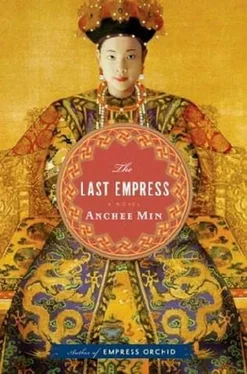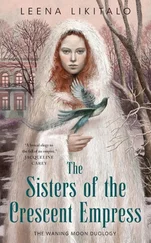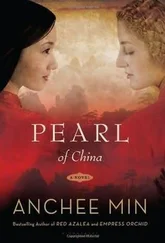"I am a lucky woman," Mother used to say. I believed her when she said that she had no regrets in life. She had achieved a dream: two daughters married into royal families and a son who was a highranking Imperial minister. "We were practically beggars back in 1852," Mother often reminded her children. "I will never forget that afternoon at the Grand Canal when the footmen deserted your father's coffin."
The heat of that day and the smell of rot that came from my father's corpse stayed with me as well. The expression on Mother's face when she was forced to sell her last possession, a jade hairpin that was a wedding gift from our father, was the saddest I had ever seen.
As Emperor Hsien Feng's senior wife, Empress Nuharoo attended my mother's funeral. It was considered a great honor for my family. As a devout Buddhist, Nuharoo disregarded tradition in accepting my invitation.
Dressed in white silk like a tall ice-tree, Nuharoo was the picture of grace. I walked behind her, careful not to step on the long train of her robe. Chanting Tibetan lamas and Taoist and Buddhist priests followed us. Making our way through the Forbidden City, we stopped to perform one ritual after another, passing through gate after gate and hall after hall.
Standing next to Nuharoo, I marveled that we had finally found some measure of harmony. The differences between us had been clear from the moment we entered the Forbidden City as young girls. She-elegant, confident, of the royal bloodline-was chosen as the Emperor's senior wife, the Empress; I-from a good family and no more, from the country and unsure-was a concubine of the fourth rank. Our differences became conflicts as I found a way into Hsien Feng's heart and bore my son, his only male child and heir. My elevation in rank had only made matters worse. But in the chaos of the foreigners' invasion, our husband's death during our exile at the ancient hunting retreat of Jehol, and the crisis of the coup, we had been forced to find ways to work together.
All these years later, my relationship with Nuharoo was best expressed in the saying "The water in the well does not disturb the water in the river." To survive, it had been necessary for us to watch out for each other. At times this seemed impossible, especially regarding Tung Chih. Nuharoo's status as senior wife gave her authority over his upbringing and education, something that rankled me. Our fight over how to raise Tung Chih had stopped after he ascended the throne, but my bitterness over how ill prepared the boy had been continued to poison our relationship.
Nuharoo pursued contentment in Buddhism while my own discontentment followed me like a shadow. My spirit kept escaping my will. I read the book Nuharoo had sent me, The Proper Conduct of an Imperial Widow, but it did little to bring me peace. After all, I was from Wuhu, "the lake of luxurious weeds." I couldn't be who I was not, although I spent my life trying.
"Learn to be the soft kind of wood, Orchid," Mother taught me when I was a young girl. "The soft blocks are carved into statues of Buddha and goddesses. The hard ones are made into coffin boards."
I had a drawing table in my room, with ink, freshly mixed paint, brushes and rice paper. After each day's audience I came here to work.
My paintings were for my son-they were given as gifts in his name. They served as his ambassadors and spoke for him whenever a situation became too humiliating. China was forced to beg for extensions on payments of so-called war compensation, imposed on us by foreign powers.
The paintings also helped to ease the resentment toward my son over land taxes. The governors of several states had been sending messages that their people were poor and couldn't afford to pay.
"The Imperial tael storehouse has long been empty," I cried in decrees issued in my son's name. "The taxes we have collected have gone to the foreign powers so that their fleets will not set anchor in our waters."
My brother-in-law Prince Kung, complained that his new Board of Foreign Affairs had run out of space in which to store the debt seekers' dunning letters. "The foreign fleets have repeatedly threatened to reenter our waters," he warned.
It was my eunuch An-te-hai's idea to use my paintings as gifts, to buy time, money and understanding.
An-te-hai had served me since my first day in the Forbidden City, when, as a boy of just thirteen, he'd surreptitiously offered me a drink of water for my parched throat. It was a brave act, and he had my loyalty and trust ever since.
His idea for the paintings was brilliant, and I couldn't paint fast enough.
I sent one as a birthday gift to General Tseng Kuo-fan, the biggest warlord in China, who dominated the country's military. I wanted the general to know that I appreciated him, although I recently demoted him in my son's name, under pressure from the court's pro-Manchu conservatives, who called themselves Ironhats. The Ironhats could not stand the fact that the Han Chinese, through hard work, were gaining power. I wanted General Tseng to know that I meant him no harm and that I was aware that I had wronged him. "My son Tung Chih could not rule without you" was the message my painting sent.
I often wondered what kept General Tseng Kuo-fan from rebelling. A coup wouldn't be hard-he had the money and the army. I used to think that it was just a matter of time. "Enough is enough," I could imagine Tseng saying one day, and my son would be out of luck.
I signed my name in fine calligraphy. Above it I put my signature stamp in red ink. I had stone stamps of different sizes and shapes. Besides the stamp, which was given to me by my husband, the rest described my titles: "Empress of China," "Empress of Holy Kindness," "Empress of the Western Palace." "Empress Tzu Hsi" was the one I used most often. These stamps were important to collectors. To make the artwork easier to sell later, I would leave out the name in my dedication, unless otherwise requested.
Yesterday An-te-hai reported that my paintings had risen in value. The news brought me little joy. I would much rather spend time with Tung Chih than feel forced to paint.
Anyone who examined my paintings could see their flaws. My brushstrokes showed that I lacked practice, if not talent. My handling of ink revealed that I was merely a beginner. The nature of rice-paper painting allowed no mistakes, which meant that I could be spending hours on a piece, work late into the night, and one lousy stroke would ruin the entire thing. After months of working on my own, I hired an artist-tutor whose job was to cover my flaws.
Landscapes and flowers were my subjects. I also painted birds, usually in pairs. I would place them in the center of the frame. They would perch on the same or separate branches, as if having a chat. In vertical compositions, one bird would sit on the top branch and look down, and the other would be on the bottom branch looking up.
I spent the most time on feathers. Pink, orange and lime green were my favorite feather colors. The tone was always warm and cheerful. An-te-hai suggested that I paint peonies, lotus blossoms and chrysanthemums. He said that I was good at painting these, but I knew he meant they were easier to sell.
A tip I learned from my artist-tutor was that the stamps could be used to cover flaws. Since I had flaws everywhere, I applied a number of stamps to each painting. When I was dissatisfied and wanted to start over again An-te-hai reminded me that quantity should be my objective. He helped to make the stampings look interesting. When I felt there was nothing I could do to save a work, my tutor would take over.
My tutor worked mostly on backgrounds. She would add leaves and branches to cover my bad parts and would add accents to my birds and flowers. One would think that her fine strokes would make mine an embarrassment, but she applied her skill only to "harmonize the music." Her artistry saved my worst paintings. It was amusing to watch her painstakingly try to match my amateur strokes.
Читать дальше












